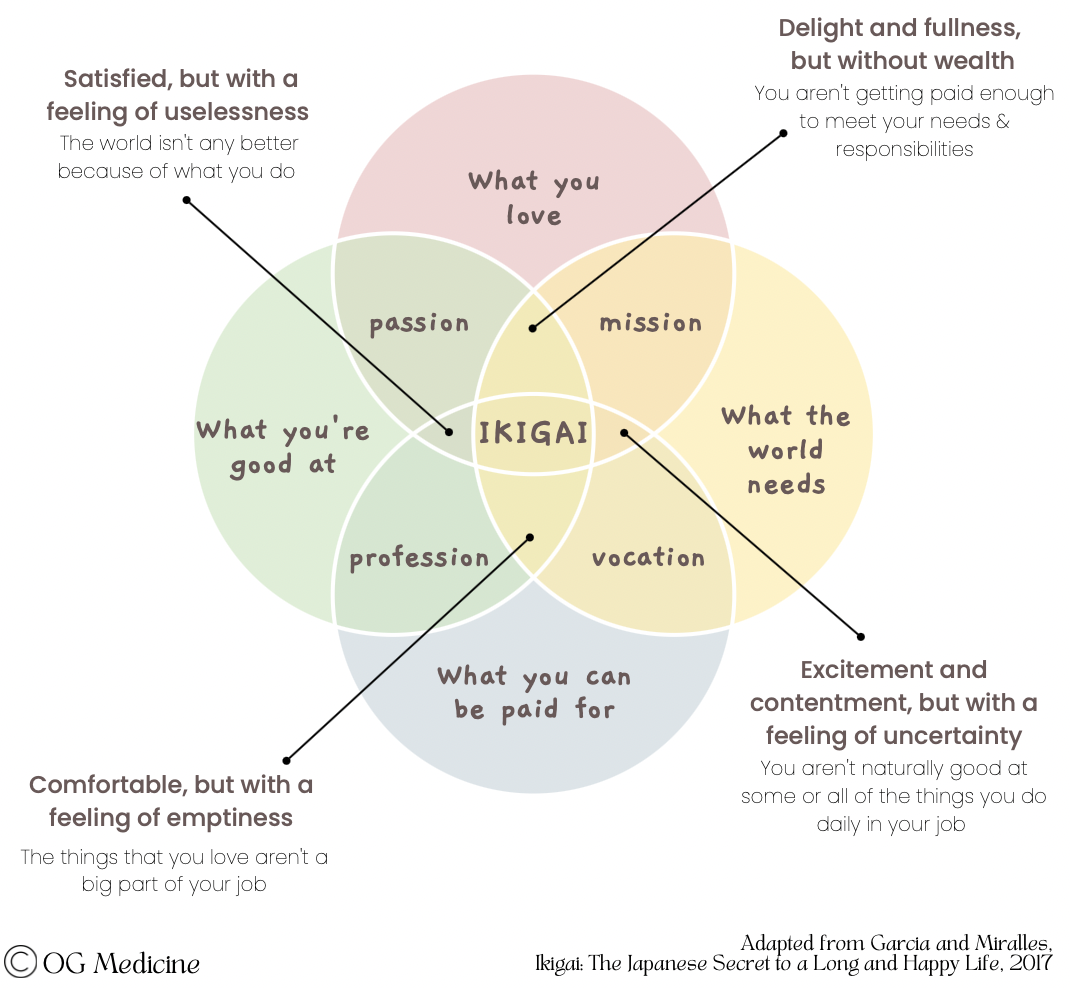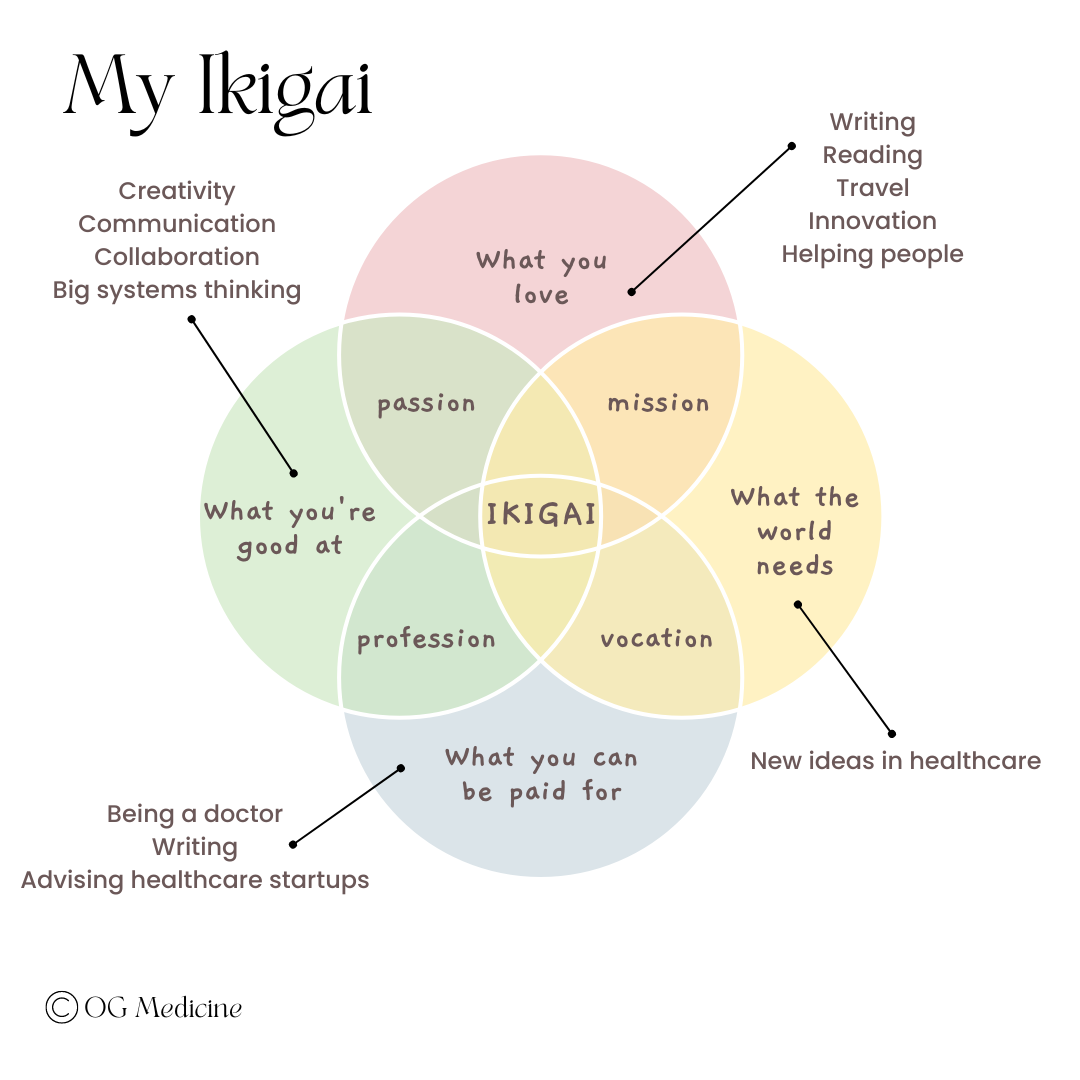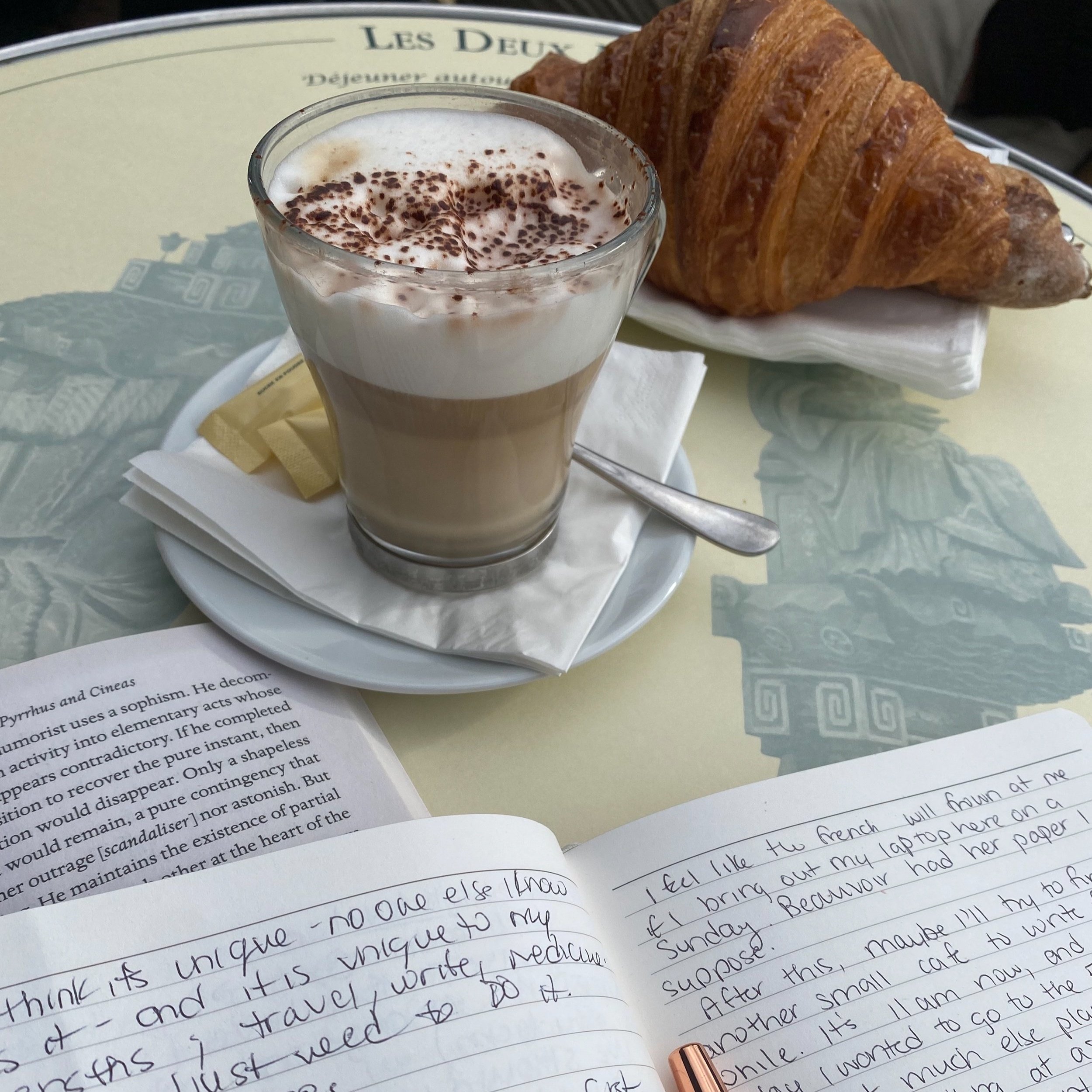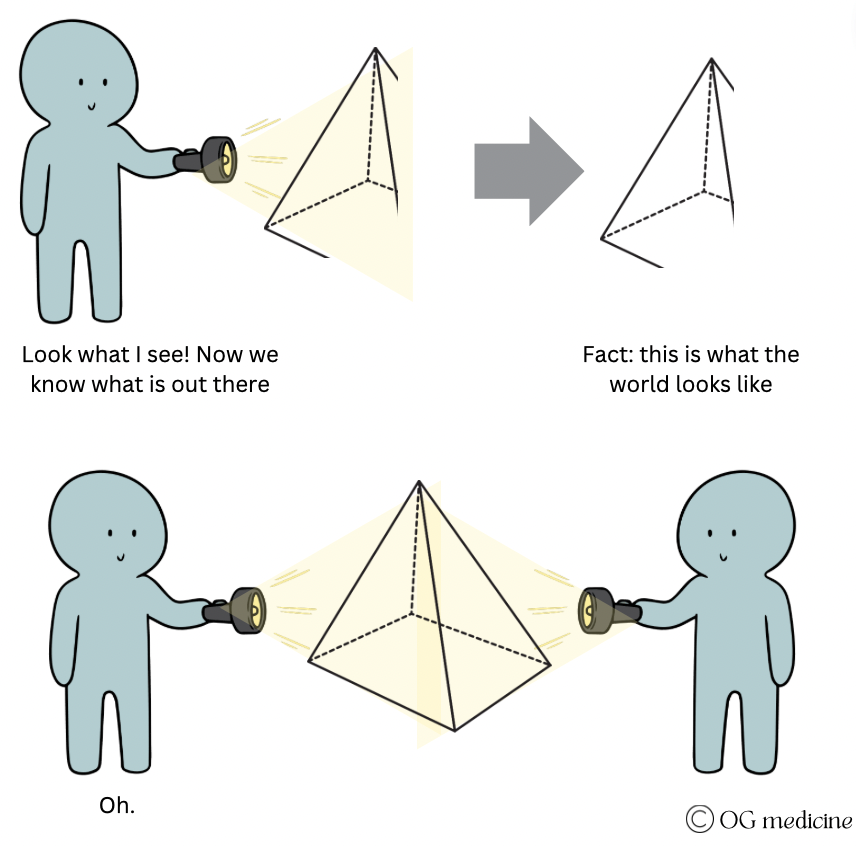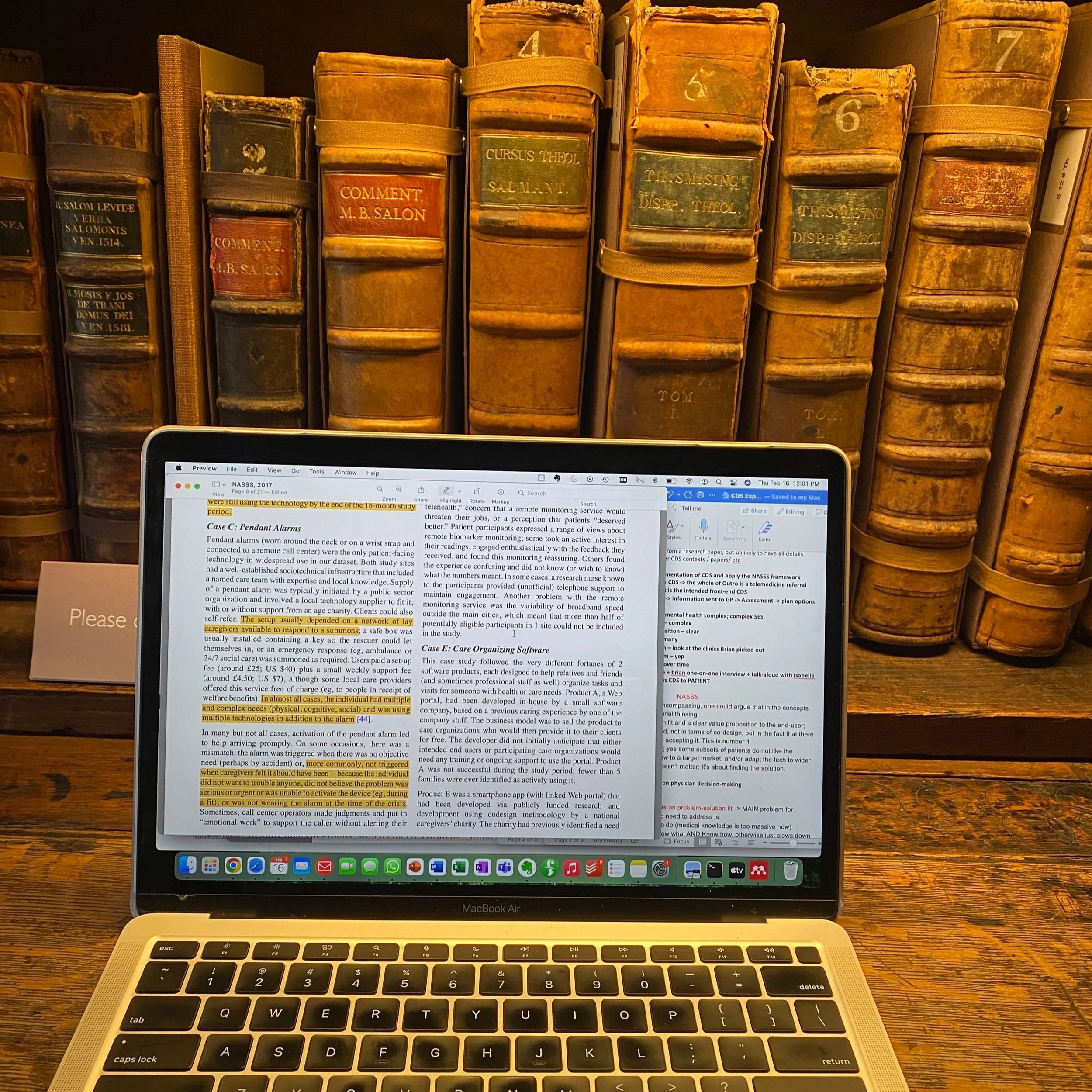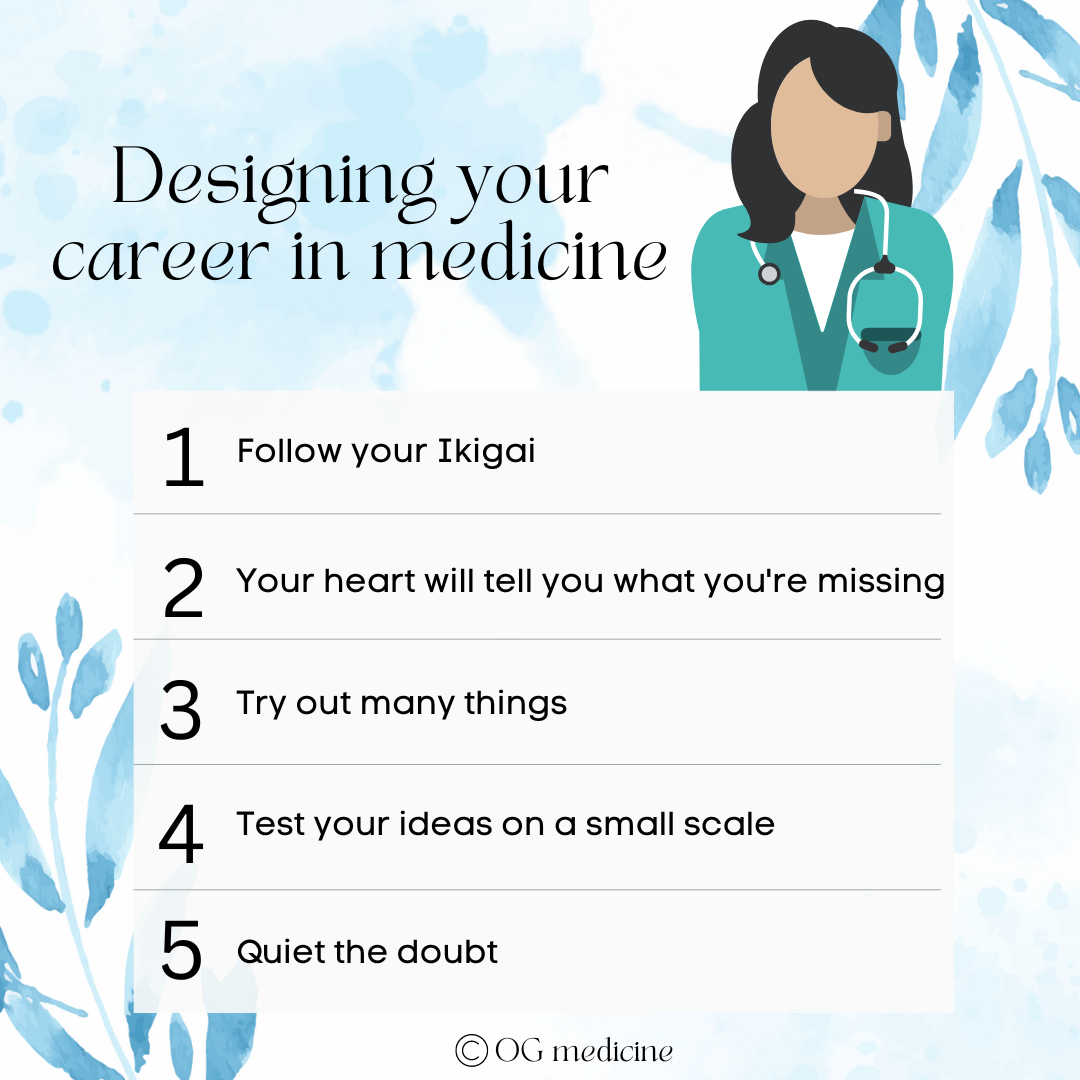Designing Your Career in Medicine
Subtitle: Is healthcare your whole story?
By Olivia Geen, MD, MSc, FRCPC
| 10 min read |
It's been a few years nows since I started to realize that full-time clinical medicine wasn't the end of the story for me. Something else was pulling me forwards into a different direction, I just didn't know what that direction was.
Figuring out what you want to do in life isn't easy. I don't think the decision is ever truly finished, because just like everything else that's alive, your life is an evolution of growth, discovery, and change. However, you’ve got to start somewhere.
This post will take you through 3 key steps to figuring out if you want to change, what you might want to do, and how to get there.
Success will come from listening to logic and your heart - something evidence-based healthcare workers often struggle to do - to find that magical place that is meant for you and only you.
I promise, there is something unique in this world that you are meant to do. What that is, is up to you. It won't happen unless you create it. So let's begin
London, England, from above, Feb 3, 2023. On my way to the University of Oxford to study health organizations and policy - i.e. follow my Ikigai
1) How to know if you need to change
This topic could fill a whole book, but I will keep it to a few essential points that will get you started.
Usually people start to think about changing careers when they feel 1 of 4 things:
1. Uselessness
2. Emptiness
3. Uncertainty, or
4. A lack of money.
Don't just take it from me. These four signals are adapted from the Japanese concept of Ikigai, which roughly translates into "reason for being". You can read more about Ikigai here.
This means you'll have to learn to listen to your feelings. GASP. This is a hard one for people typically drawn to medicine. We tend to be logic driven over-achievers who stifle personal feelings for the benefit of our patients and the system that we work in.
Eventually, those feelings will catch up with you. It's either now, or later as a mid-life crisis.
If you listen to yourself early, it will show up as a feeling of uselessness, emptiness, or uncertainty, but if you ignore the signals, it might show up as a more desperate alert like burnout or depression (see our recent publication on resident burnout for a more in-depth discussions on burnout in medicine).
The good news is that these feelings are actually guiding you, even if they're uncomfortable. They're there to give you directions. Think of your emotional insides as a google map. You get alerts when you're going in the wrong direction.
The problem is that we usually don't listen to the alerts and continue on driving, ending up somewhere we never really wanted to be.
It's important to note that if you feel 1 or more of these signals, it doesn't necessarily mean you need to leave medicine completely. It might mean you need to reduce clinical work to take on new roles, like leadership or advocacy, or tweak some other aspect of the job, rather than starting from scratch.
Take my story for example. My ikigai is below. Many jobs could have fit this diagram, even within medicine, but in the end, it turned out to be doctor-who-writes-and-works-with-startups-to-change-healthcare. You won't find that on a typical career posting. Sometimes you have to make your own path if you want the perfect fit for you.
My ikigai has changed overtime. Every time I learn something new about myself and I wonder “am I on the right path?”, I go back to my ikigai and update what feels right to me. You don’t plan your ikigai, you discover it slowly over time.
Keep in mind that you might temporarily feel you’re missing something at different points during your career, rather than these things being permanent flaws of the job. Residency is a perfect example of this - an almost constant feeling of uncertainty with not enough money.
To avoid cutting out too early on a career that is actually meant for you, identify where these feelings are coming from. Ask yourself “will this change? or do I need to remove myself from this situation?”. This will help you tease out whether this is something that will improve as you move through your career, or whether the job will always leave you feeling this way.
For myself, I’ve now getting closer to the right mix of direct patient care (about 50% of my time), innovation work (about 20% of my time) and writing (about 30% of my time). I no longer feel useless, uncertain, or empty.
2) How to figure out what you want to do
After completing your ikigai diagram, you'll have a better sense of what you're missing in your current career.
The next step is brainstorming things that could fill in those missing circles, and testing them out on a small scale.
Brainstorming looks different to different people. It could look like journaling, taking notes, talking to other people, listening to music, watching documentaries, traveling, or reading books (another good option). Anything that gets your soul searching and your mind pulling together new ideas.
However, at the end of the day, you've got to get in there and actually try stuff out.
Just like how you learned about medicine from a textbook but learned how to do it through real-life experience during residency, you can learn about yourself by reading and brainstorming, but you've got to get some real-life experience to figure out what you actually want to do. There's a difference between the "know what" - listen to your heart - and the "know how" - your ikigai.
This journal entry was after years of trying out different “doctor+ ideas” ie. being a doctor and adding in something else. I did everything from being an academic researcher in the field of Geriatric Critical Care, studying Translational Health Sciences at the University of Oxford, joining a startup as their Director of Knowledge Translation, and starting a blog for patients and their caregivers. I still had a feeling of emptiness, meaning that I wasn’t doing enough of the things I loved. Finally, at Les Deux Magots cafe in Paris, France, where one of my favourite philosophers, Simone de Beauvoir, used to write, I decided to try a blog for people working or interested in healthcare. Voila, c’est parfait! The journey continues, as this idea will morph and grow over time.
3) Quiet the doubt
This is one of the hardest things to do. We can all come up with amazing lists of possible careers, and even eventually land on what we're uniquely meant to do. But to turn this dream into a reality you've absolutely got to manage the doubt that creeps in, often just before we’re about to do something really great.
Doubt can come from two places: outside or inside.
Doubt from outside comes from friends, family, colleagues, or even strangers. This might look like someone asking “Isn’t medicine enough for you?” often implying that medicine is an amazing career and you should be grateful for the privilege of doing the job.
The key here is realizing that multiple things can be true.
Yes, medicine is a great career that I am incredibly grateful for, not least of all because it allows me to help people. However, it’s also true that I can’t stop seeing the vast problems in the system and I want to do something about it, and I can’t do that if I’m in clinic 8-6pm 5 days a week.
Two things, 3 things, 10 things, an unlimited number of things can be true about the same situation. It just depends on how you look at things, and making room within yourself for these multiple truths is important. You don't have to pick just one description of reality, because reality is hugely complex. Hold all of these facts in your mind at the same time, and know that each one is real.
Multiple things can be true: the more viewpoints (perspectives, values, opinions) that are considered, the more fully we are able to know what is really going on.
A caveat to that is that sometimes we are actually chasing the wrong things. The key with Ikigai is to chase what uniquely resonates with you, which requires reflection and soul searching. For a bigger discussion on this, try this book (the title is misleading; it’s about figuring out what you care most about).
The other place that doubt comes from, is inside ourselves. It’s that little voice in the back of your head that says "Who do you think you are? You’re not that special... lots of people don't like their job. Who are you to think life could be more than this?"
This little voice - let's call her Geraldine (you can name yours anything you'd like), will come and go. She'll usually pop up when you face resistance or a difficult obstacle, like getting rejected from a job or program you wanted to do, or when other parts of your life aren't going well.
Maybe you messed up at work today, got some less-than-glowing feedback, or made a mistake with a friend. Whenever something happens that brings up the little thought of "Uh oh, I'm not perfect", Geraldine is usually close behind saying "See, I knew it. You're not so great. You're just normal, or worse, less than average". Geraldine is a bit close-minded, and she's totally one-sided. She doesn't look at the full picture.
The first thing to realize is that perfectionism makes your life harder than it needs to be. If you want to learn more, read this. The second thing, is that when Geraldine comes out, you don't need to believe her. You'll need to listen to her a little bit - she hates being ignored - but after giving her a bit of airtime (wallow for a few hours about messing up and being human), you'll need to counter her comments with a view of your own. You need to literally say out loud to yourself that you have something unique to add to this world, and you won’t stop working towards your ikigai.
Don't forget all the proof you've built up over your lifetime that you can succeed (you’re in healthcare! a really tough field!), and if all else fails, just keep telling yourself that you can do this. Because you can. As long as you don't let Geraldine win.
I’ve wanted to go to the University of Oxford since I was 8 years old. I didn’t think I was smart enough to get in, and so I never applied when it came time to choose universities. Years later, at the age of 29, I decided to try, after already finishing 12 years of university education. I was rejected from the first program I applied to - a Master’s in Ethics. I’m so glad that I was. A few months later I became interested in innovation and entrepreneurship, and I came across a new program at Oxford. I applied and was accepted into the Master’s of Translational Health Sciences, which studies the science of innovation and change in healthcare.
(Picture: Duke Humfrey’s Library, part of the Bodleian Library, at the University of Oxford, 2023. Backstory: my favourite library to write, read, and have big ideas in).
PUTTING IT ALL TOGETHER
A few years ago I did a career panel at the Canadian Geriatric Society annual scientific meeting. Although it was about choosing a medical subspecialty, the same advice can be applied to changing your career. I’ve included the highlights and combined them with this post, as a reminder of what steps come next:
Reflect on yourself and your Ikigai, or what you love, what you’re good at, what the world needs, and pragmatically, what you can get paid for
Listen to your heart - it will tell you what you’re missing
Explore your options - explore many things first to ensure you pick the right one later
Test your theory - find ways to start small to experience a taste of what your idea would be like in reality (just like how we do rotations in different specialties before choosing one for life)
Quiet the doubt - seek input from others, but never change your mind based on one data point
Now, go forth, believe in yourself, and listen to your heart. Your heart will never stop speaking to you, so you may as well start to listen now.
Yours,
Olivia
Dr. Geen is an internist and geriatrician in Canada, working in a tertiary hospital serving over one million people. She also holds a masters in Translational Health Sciences from the University of Oxford, is widely published in over 10 academic journals, and advises digital healthcare startups on problem-solution fit and implementation. For more info, see About.
Influences
Life experiences.
Garcia H and Miralles F. Ikigai: the Japanese secret to a long and happy life, 2017.
Manson M. The subtle art of not giving a F*CK, 2016.
Burnett B, Evans D. Designing your life: how to build a well-lived joyful life, 2016.


